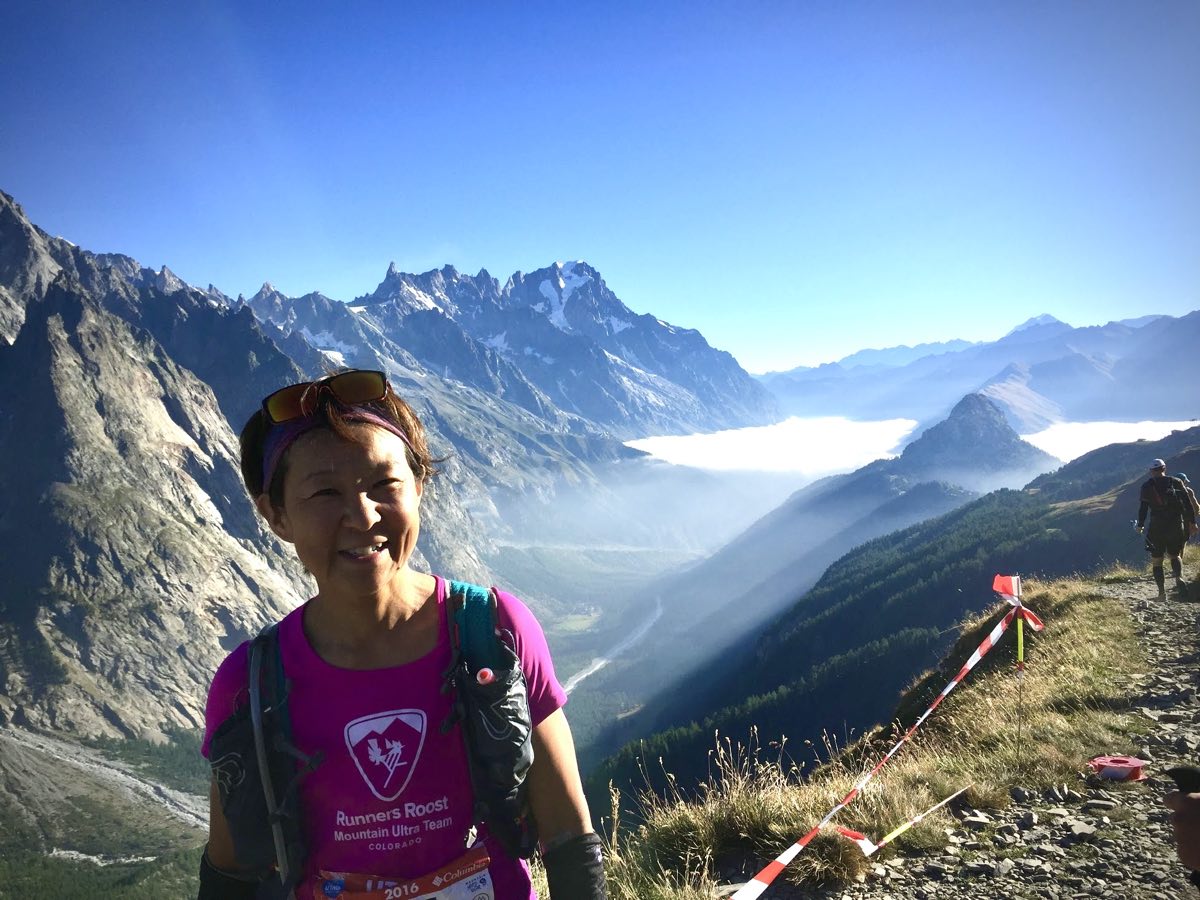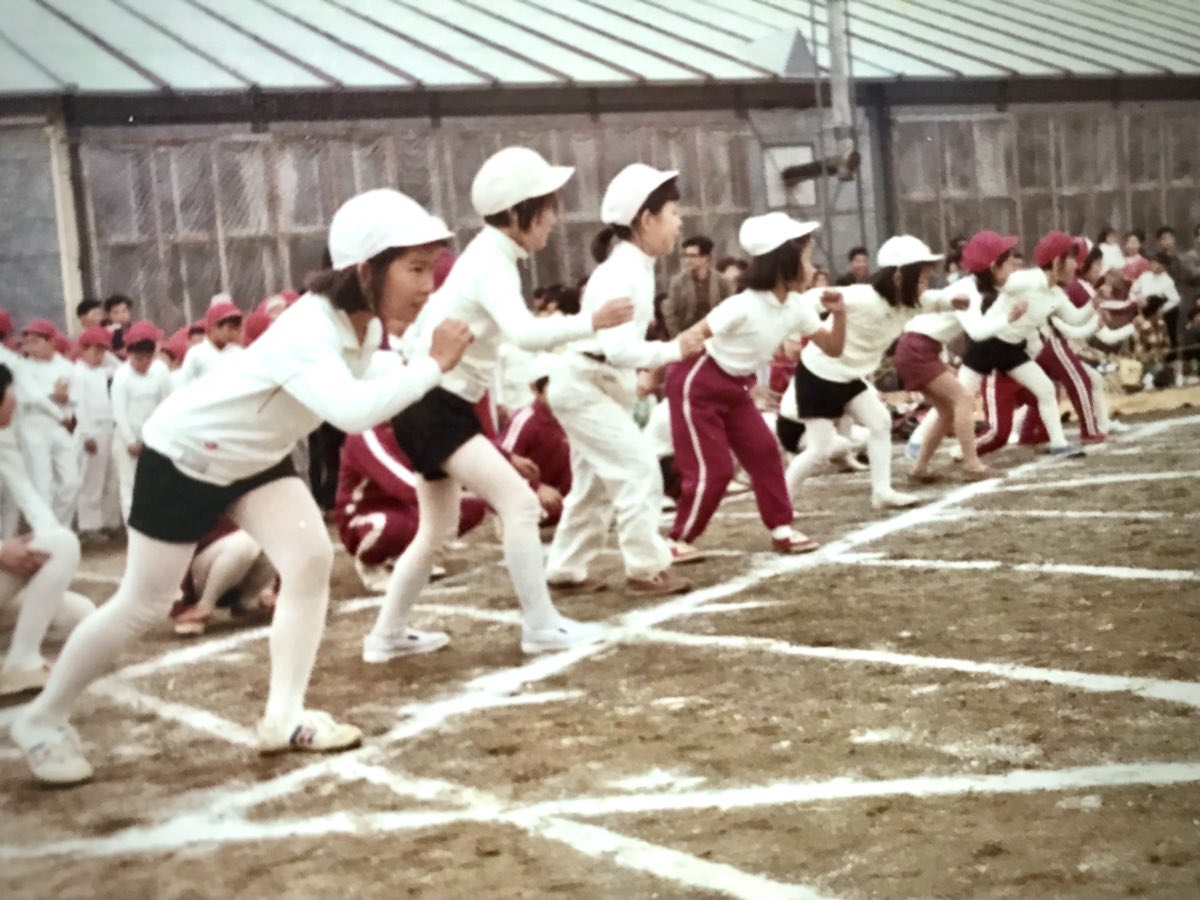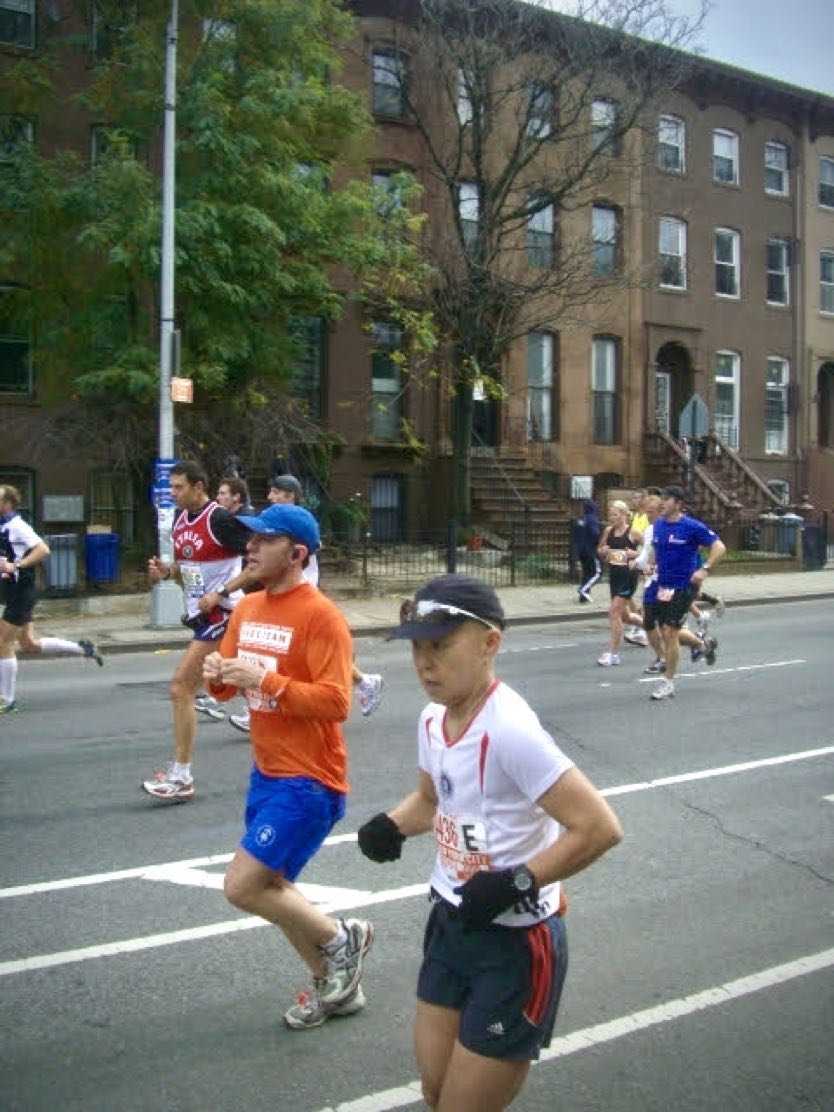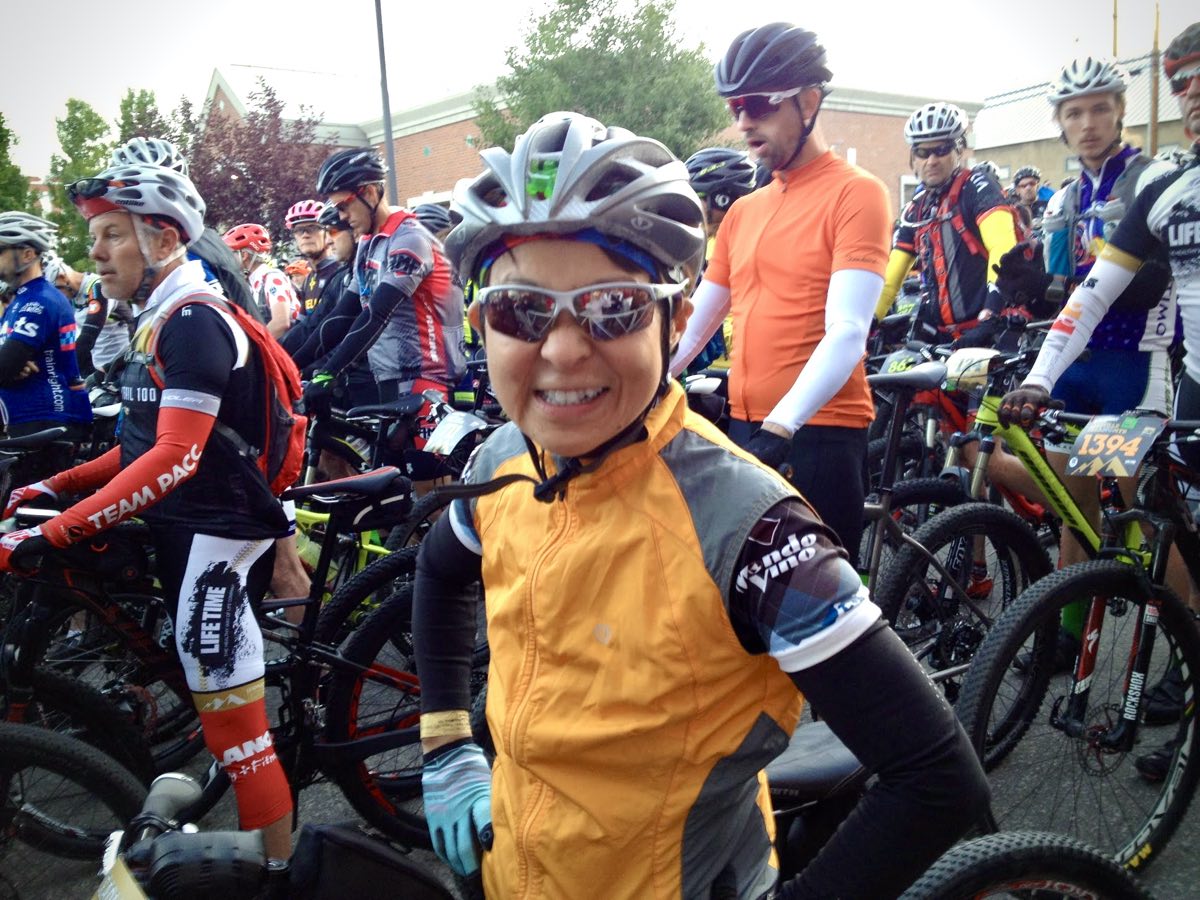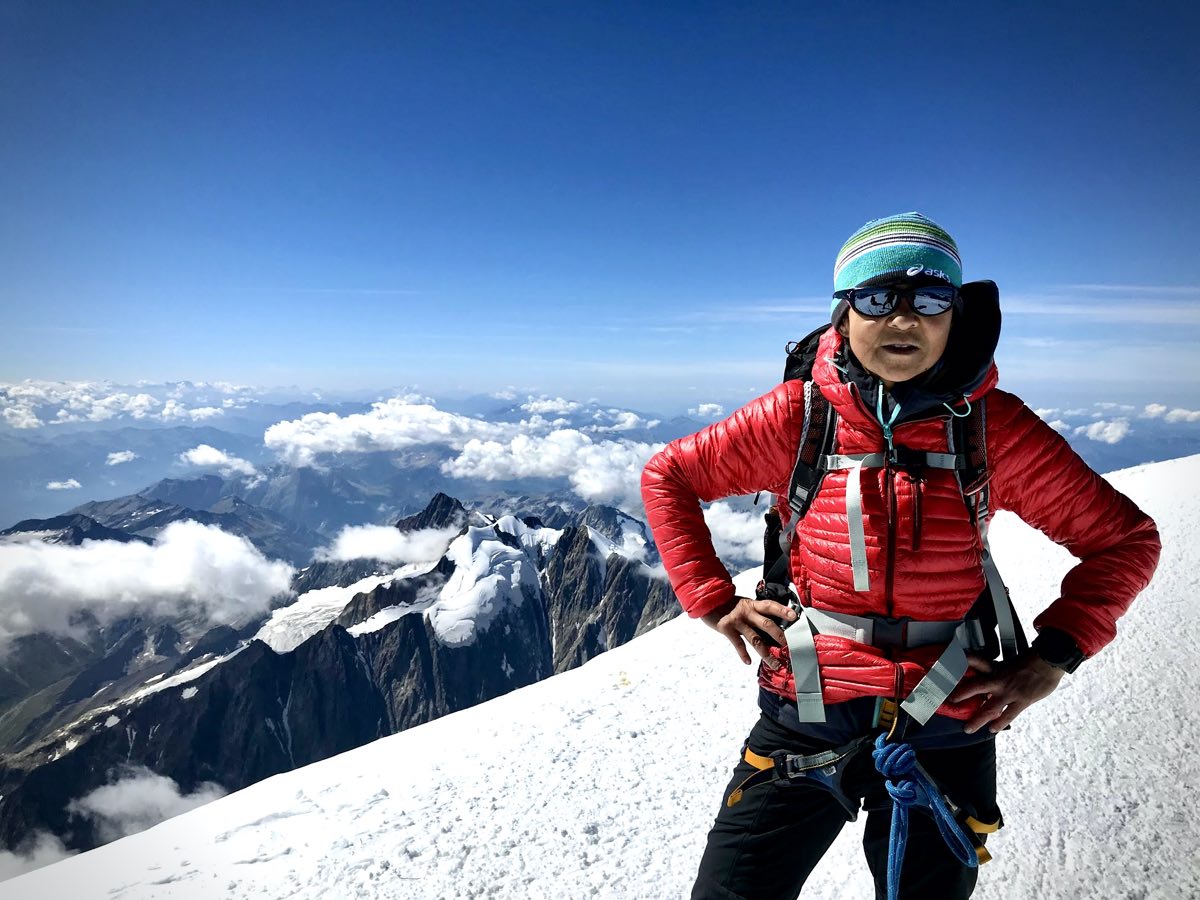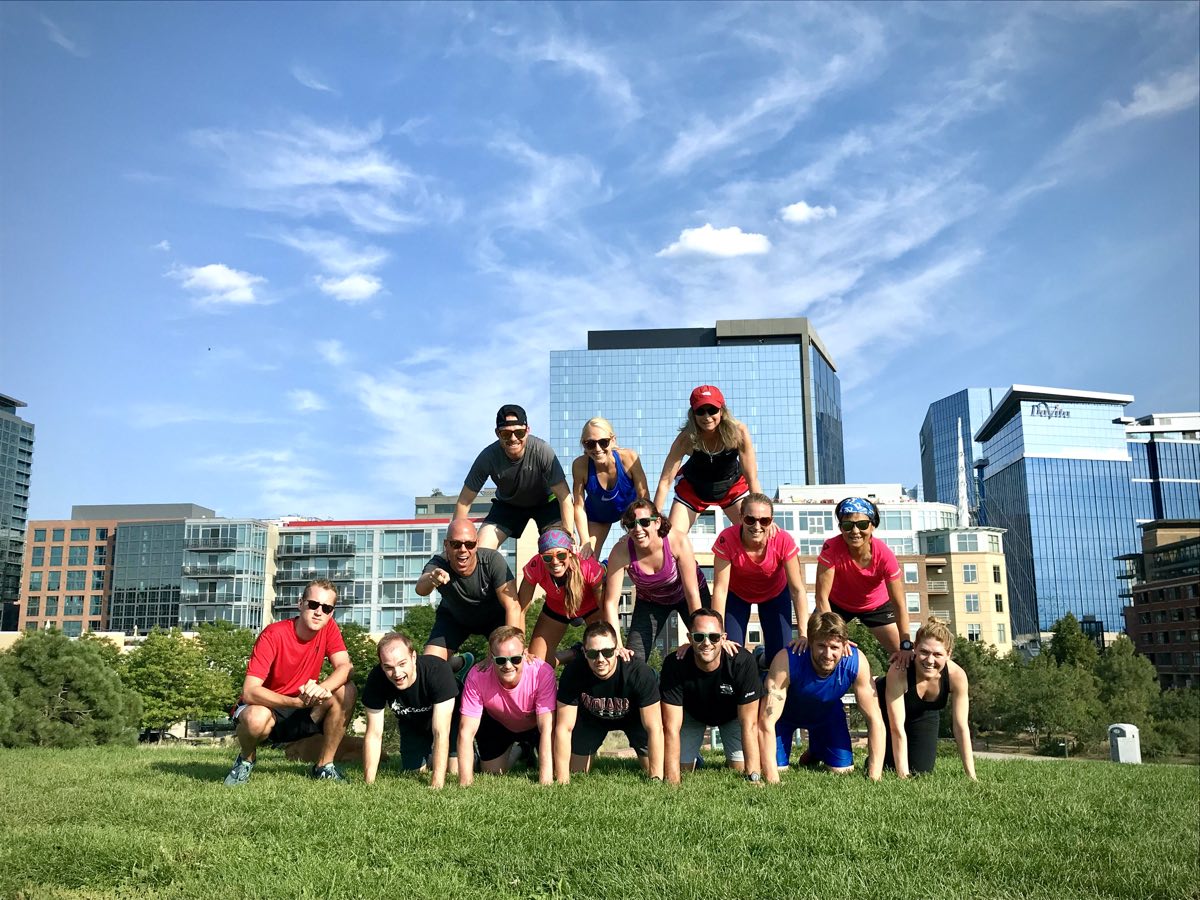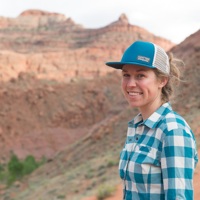Junko Kazukawa is widely known both for her ultrarunning athleticism and for encouraging others’ fitness goals. In 2016, I was new to trail running—and really, running as a sport—when we first crossed paths. I was eager to spend more time on trails in the mountains, so I signed up for a race that inspired me, the Leadville Trail Marathon. An email from the race organizer included an announcement for Junko Mountain Training, a training plan and group provided by coach and personal trainer Kazukawa to help prepare for the event. I showed up to the first gathering, excited and nervous, outside of Denver, Colorado, where we both lived then. Without hesitation, Kazukawa invited me along to her other training days and community run meet-ups. She saw my curiosity and encouraged me, showing me that I was capable of running far by sharing tough miles together and laughing along the way.
Kazukawa was the first person to tackle both the Grand Slam of Ultrarunning and Leadville Race Series in a single season, in 2015. For the Grand Slam of Ultrarunning, she ran each of the Western States 100, Vermont 100 Mile, Wasatch Front 100 Mile, and Leadville Trail 100 Mile between June and September. To complete the Leadville Race Series—a title known as Leadwoman or Leadman and a combination of running and mountain-biking events peppered over the course of a summer—she had to finish the Leadville Trail Marathon run, cover 50 miles in either the Silver Rush 50 Mile mountain-bike race or run, finish the Leadville Trail 100 Mile mountain-bike race, do the Leadville 10k run, and complete the Leadville Trail 100 Mile run. Kazukawa actually did both of the 50-mile bike and run events, earning a third laurel termed the Silver Queen. What a summer that was!
Kazukawa had finished her first-ever century run only four years prior to this mega feat—the 2011 Leadville Trail 100 Mile, at age 48—a goal she used as closure after her second bout of breast cancer, the emotional trauma of chemotherapy, and a mastectomy. “You never know what you’re going to get with your physical self,” she recalls of that time.
Her journey as an endurance athlete began early, when Kazukawa nearly failed physical-exercise (P.E.) class in school. She grew up in Sapporo, the capital of Japan’s mountainous northern island, Hokkaido, and where ski jumps for the 1972 Olympics still pepper the city. She grew up alongside her brother and sister, who both still reside in Japan. Her earliest memories of the outdoors are of P.E. class and playing with her siblings at a playground. She says she “hated” P.E. back then, and she would’ve rather been reading, she laughs. But to help improve her P.E. grade, she joined basketball in junior-high school, when she was 14 years old.
“When I played basketball, running was part of the training. We had to run from our school to the beach. That was hard. In high school, we had to run a 10k race as preparation for basketball. Eventually, I signed up for the half marathon—it was hardest thing I’d ever done, at the time,” says Kazukawa.
Basketball became a segue into an all-around healthier lifestyle for Kazukawa. She started hiking in the mountains, studying nutrition, and eating a balanced diet. She decided to pursue a college degree in the United States, where she could learn the English language while studying exercise physiology and kinesiology. In 1987, the then 24-year-old moved across the world to attend the University of Northern Colorado, in Greeley. To prepare, she spent a quarter doing an intensive English program at the University of Denver.
After she graduated from college, she taught group-fitness classes at a local health club and hosted workshops for a physical-therapist manager. Eventually, her fitness career led her to jobs in downtown Denver. During that time, one of her clients was training for the Boston Marathon, and Kazukawa became intrigued. She ran for all-around fitness but had never trained for an event. “I didn’t know anything about training for marathons or about the Boston Marathon. But, I ran the Tucson Marathon and qualified for Boston at 37 years old. I ran it the following year and started running a lot of marathons. I ran Boston again the next year, wanting to go faster. I became obsessed,” she says. At print, she’s finished the New York City Marathon a dozen times and the Boston Marathon 10 times with a 26.2-mile PR of 3:20.
But after training for countless marathons and a half-decade after her debut race in Boston, she was diagnosed with breast cancer. She was just 42 years old. “It was shocking. I was doing a self breast exam and found a lump, so I had it checked, and it was cancerous,” she says. Her treatment included radiation therapy and a lumpectomy, the latter a surgery to remove the cancerous tissue. “The day after my lumpectomy, I taught workout classes and trained clients. I was emotionally damaged but I continued to teach and train for marathons,” says Kazukawa.
She went into remission, recovered, and trained for the 2005 Leadville Trail 100 Mile mountain-bike race, but ultimately missed the race’s final cutoff. She returned in 2007 and finished in 12:26:43, and shaved off time in 2008, with an 11:56:21. But after four years of being in remission, she was diagnosed with breast cancer, again, in 2009.
“The second time I was diagnosed, it hit me more. First of all, it came back. And the second time, I had to do a mastectomy, a big surgery that takes all your breast tissue out, and go through chemotherapy, which made me lose my hair, throw up, and just identify more with having cancer,” she says.
As an immigrant, her immediate family was overseas. “I was really debating, ‘Should I even tell my mom?’ Because, she cannot be here. She doesn’t speak English. I didn’t want my family to worry. One of my good friends, Linda, went to my doctor’s appointment with me, and said, ‘If I were your mom, I would want to know.’ So, I told them two days before the surgery. And I also had good support with friends here,” says Kazukawa.
Recovering from a mastectomy was anything but easy. She was extremely uncomfortable and couldn’t move her body very well. After each round of chemotherapy, she felt sick and nauseous. On her “bad days,” she had to find substitute instructors to cover her fitness classes. Despite the pain, she continued to teach fitness when she could and occasionally jogged, but could not train for races or physically push herself. “I was trying not to sit around crying. As I went along in the chemotherapy, I adapted to how I felt and learned how to deal with it,” she says. Her chemotherapy rounds were every three weeks for three months.
This fight with cancer made her question her purpose, time, and life goals. “I wanted to do something big. I had raced the 100-mile mountain-bike race in Leadville and it was hard, but I’d always wondered how people ran 100 miles,” she says, referring to the historic and hard 100-mile run likewise organized by the Leadville Race Series. “I thought, If you wait too long, you don’t know what’s gong to happen. I’m just going to do it,” she says, a decision she made after she finished chemotherapy, lost all of her hair, and ran the New York City Marathon bald. After, she signed up for the 2011 Leadville Trail 100 Mile run and used the goal to fundraise more than $6,000 for the Susan G. Komen Foundation. And she crossed the finish line. Four months later, she raced The North Face Endurance Challenge 50 Mile Championships, too. She returned to race the same 100 miler in 2012 and 2013, before tackling her first Leadwoman title, in 2014. In 2015, she made history as the first endurance runner to accomplish both a Leadwoman title and the Grand Slam of Ultrarunning in the same year, at 52 years old.
Then, in 2016, she set her sights on one of the hardest races she’s ever finished, the 106-mile UTMB, which encircles Mont Blanc in the Alps and travels through France, Italy, and Switzerland over the course of the event. “It was a great race and it was hard. There’s no flat place to run. It’s either steep uphills or steep downhills. That year, it was extremely hot weather, so the finishing rate was low. I had a hard time, too, but I’m pretty good with the heat,” she says.
Two days after finishing UTMB, she booked a guided mountaineering trip to summit 15,774-foot Mont Blanc. The trip included two nights and three days of practicing hiking, climbing on rocks, and glacier travel. “At the last minute of our attempt to summit, our guide decided, ‘We can’t go.’ People were getting rescued by helicopter off the summit, because it was so warm,” she says.
Two years later, she returned to race UTMB a second time, with a goal of finishing faster. The conditions were cold and rainy, and she fought with hypothermia and nausea for hours, before dropping at mile 75. Post-race, however, she had a perfect summit day on Mont Blanc.
UTMB is the only event she’s DNFed, and she feels like she needs redemption. “UTMB is one of the hardest races out there. It’s adventurous and there are people from all over the world. Those are all really fun factors,” she says. She’s signed up for the 2021 UTMB, and hoping for her redemption day.
Another of Kazukawa’s all-time favorite races was the 2017 Ultra Fiord 100 Mile in Patagonia, where she took second place. “Ultra Fiord was so memorable. I’d always wanted to go to Patagonia. I had to run through a continuous 30 miles of mud up to my knees. You have to go through a glacier, with a crevasse, in the high peaks,” Kazukawa remains drawn to the most challenging races. She’s finished the Leadville Trail 100 Mile run seven times and plans to finish 10 times, so that she can earn another race-series award, the 1,000-mile big buckle.
Kazukawa now works at the Colorado Athletic Club (CAC) in downtown Denver, where she recently celebrated her 12-year anniversary. Following the COVID-19 outbreak, many athletes paused their gym memberships and instead meet with her one-on-one outdoors or at their home for their training sessions. She continues to do online coaching for athletes with a range of goals, from strength and mobility for seniors to race training for trail runners and ultrarunners. She’s also CAC’s run-club coordinator which, prior to COVID-19, hosted a robust weekly meet-up for road and trail runners. Beyond the CAC, Kazukawa is on the Berkeley Park Running Company run team, dubbed the Wild Jackalopes. She’s also an ambassador for NUUN and on Altra’s Team Red.
“I’ve been doing this for long time, and I like sharing my experience with others through coaching. I can help change their lifestyle. And I love that moment when people accomplish their goals,” says Kazukawa.
In 2019, Kazukawa’s mother became gravely ill. “I was flying to Italy to race the 200-mile Tor des Géants, my dream race. When I arrived to Europe, I got the news and had to board a flight to Japan instead. That was the hardest thing that has happened in my life. I spent a couple of months with her, before she passed away. I was there for the funeral,” she remembers. While she was away, her community of friends took care of her house, trained her clients, and fundraised money for her while she couldn’t work.
“I’m not still back to my normal emotional state, but doing a race this year will help me heal. Everyone is having a really hard time with the pandemic, and hopefully I see more people on the trails and racing. Despite those challenges, I’m thankful for what I have—this environment with the mountains right here. I have good friends. I am grateful and hopefully I can pay it forward, doing good things for others,” she says.
Reaching the summit of Mont Blanc has inspired her to climb more peaks. She’s been summiting the dozens of 14,000-foot peaks across Colorado. “I want to do more mountaineering. That’s my future,” she says. But so is running the Tor des Géants and the Moab 240 Mile.
She says, “With ultrarunning, you can see incredible parts of the world, meet people along the way, and feel a great sense of accomplishment when you finish. It’s mental too: you’re constantly fighting with yourself and you have to win over you. That’s all motivating to me.”
Kazukawa has built a life focused on seeking her goals and helping others realize theirs. With her mentorship, I believed in myself, trained, and ran my first 50 miler that same year we met, in 2016. To me and to so many other trail runners and ultrarunners, Junko Kazukawa exemplifies the warmth, heart, and spirit of this community.
Call for Comments
Want to share a story about running, training, traveling, or adventuring with Junko Kazukawa? Leave a comment! Thanks.
